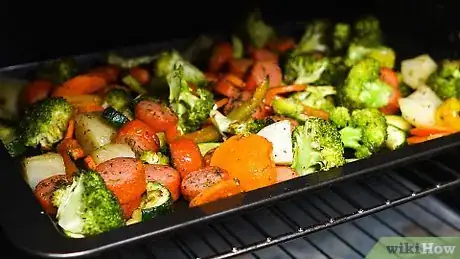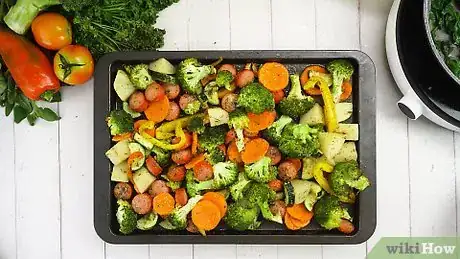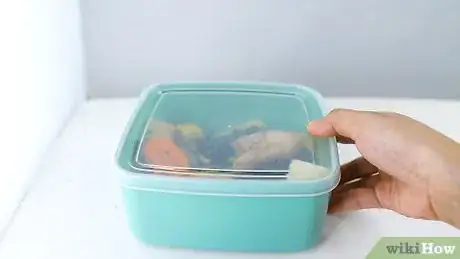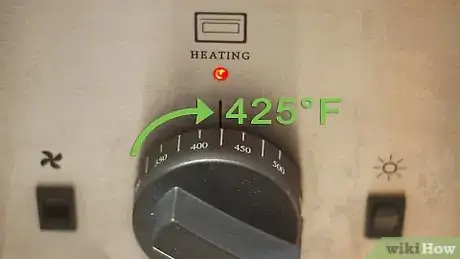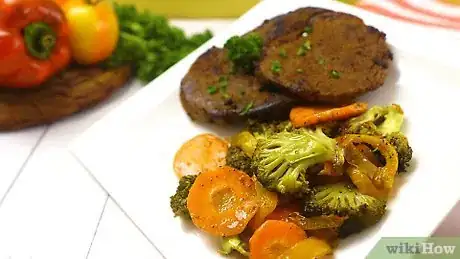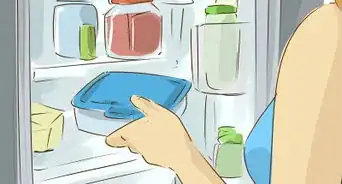This article was co-authored by wikiHow staff writer, Hannah Madden. Hannah Madden is a writer, editor, and artist currently living in Portland, Oregon. In 2018, she graduated from Portland State University with a B.S. in Environmental Studies. Hannah enjoys writing articles about conservation, sustainability, and eco-friendly products. When she isn’t writing, you can find Hannah working on hand embroidery projects and listening to music.
The wikiHow Video Team also followed the article's instructions and verified that they work.
This article has been viewed 13,697 times.
Learn more...
Roasting vegetables is a great way to add flavor and texture to fresh vegetables of your choice. Extra roasted vegetables can be hard to store, since they have a tendency to get soggy when left out. Fortunately, you can pack up your roasted vegetables and reheat them so they are crisp and delicious the second time around.
Steps
Keeping Roasted Veggies in the Fridge
-
1Roast the veggies until they are just underdone for big batches. Since you’ll be reheating your make-ahead vegetables, you don’t need to roast them all the way. Take them out of the oven about 5 minutes early, when the vegetables are still slightly stiff.[1]
- When you undercook your vegetables the first time, you can finish them up in the oven when you reheat them.
- If you’ve already roasted your vegetables all the way, that’s okay too. They’ll still be good when reheated!
-
2Let your roasted vegetables cool to room temperature. If you put your vegetables in the fridge too early, they could get soggy because of the steam. Set them on the counter until they are mostly cooled down before you store them, and try to get them in the fridge within 2 hours after you take them out of the oven.[2]
- The cooler your vegetables are, the longer they will last in the fridge because they will be less moist.
Advertisement -
3Store your vegetables in an airtight container. Pack as many vegetables into an airtight container as you can and make sure the lid fits on snugly. You can separate your vegetables into different containers, or you can mix them all into one.[3]
Alternative: If you don’t have an airtight container, you can cover the roasting pan with aluminum foil instead.
-
4Keep the vegetables in the fridge for 3 to 4 days. Since your roasted vegetables are already cooked, they won’t last for much longer than 1 week. Try to eat them within 3 or 4 days for the best flavor and texture.[4]
- You can even eat cold roasted vegetables straight out of the fridge, if you’d like.
Freezing Roasted Vegetables
-
1Pack your vegetables into an airtight container. Choose a plastic bag that can be sealed or an airtight container with a lid. Try to put your vegetables in a single layer so that they freeze evenly and don’t get stuck together.[5]
- If you have a lot of frozen vegetables, put them into 2 separate containers rather than stacking them on top of each other.
-
2Label the container with the date frozen. Use a permanent marker to write on the bag or container that you’re using so you don’t forget how long your vegetables have been in the freezer. That way, you’ll know if you need to dispose of them when you take them out.[6]
- It’s a good idea to label everything you put in the freezer so you can tell if it’s still good to eat.
-
3Keep your vegetables in the freezer for 8 to 12 months. Although most frozen vegetables won’t go bad, they won’t taste as fresh after they’ve been in your freezer for almost a year. Try to eat your vegetables within 8 to 12 months for the best taste and texture.[7]
Did You Know? You don’t need to thaw your vegetables before you heat them back up again.
Reheating Roasted Vegetables
-
1Preheat your oven to 425 °F (218 °C) to oven roast the vegetables. Since your vegetables are already cooked, you don’t need to roast them again like you did before. Turn your oven on fairly high heat to blast the vegetables with some warmth.[8]
- If your vegetables got a little soggy in the fridge, the heat from the oven should crisp them right up.
- If you roasted your vegetables all the way and didn’t undercook them, that’s fine too. They’ll still crisp up in the oven.
-
2Put the vegetables in the oven for 10 minutes for an easy reheat method. Spread your vegetables out on a baking sheet and place them in the oven. Take them out when they’ve gotten crisp again and serve them while they’re still warm.[9]
- Microwaving your roasted vegetables isn’t a great idea, as they could get soggy.
Tip: Make sure your vegetables are in a single layer on the pan so that they all reheat evenly.
-
3Fry your vegetables with oil for 5 minutes for some extra flavor. Put a skillet or pan over medium heat on your stovetop and melt 1 US tbsp (15 mL) of butter or olive oil in it. Fry the vegetables for 3 to 5 minutes, or until they are crispy on the outside. You can also add some extra seasoning to the pan, if you’d like.[10]
- Cast iron skillets work great for this, but you don’t have to use one if you don’t have one.
-
4Serve your roasted vegetables as a side dish or in a stir fry. You can either eat your roasted vegetables with a hearty serving of meat and potatoes, or you can mix in some noodles or tofu to make a light stir fry. Either way, your reheated roasted vegetables will taste great![11]
- Try to only reheat your vegetables once. They won’t hold up very well through multiple times in the oven or a pan.
Warnings
- If your vegetables smell bad, don’t eat them. They’ve probably gone bad in the fridge.⧼thumbs_response⧽
Things You’ll Need
Keeping Roasted Vegetables in the Fridge
- Airtight container or aluminum foil
Freezing Roasted Vegetables
- Airtight container
- Permanent marker
Reheating Roasted Vegetables
- Baking tray or pan
References
- ↑ https://andreadekker.com/how-i-reheat-roasted-vegetables/
- ↑ https://andreadekker.com/how-i-reheat-roasted-vegetables/
- ↑ https://www.fda.gov/media/101389/download
- ↑ https://www.fda.gov/media/101389/download
- ↑ https://nchfp.uga.edu/publications/uga/uga_freeze_veg.pdf
- ↑ https://nchfp.uga.edu/publications/uga/uga_freeze_veg.pdf
- ↑ https://nchfp.uga.edu/publications/uga/uga_freeze_veg.pdf
- ↑ https://www.today.com/food/how-roast-vegetables-oven-without-oil-more-t177419
- ↑ https://www.thekitchn.com/the-3-step-technique-to-roasting-frozen-vegetables-231414
